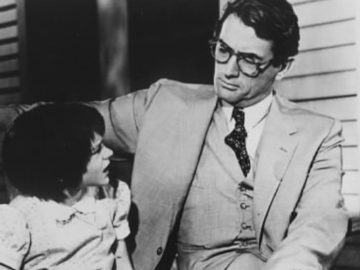Linda Besner in National Post:
 To Kill a Mockingbird is a drama of white nobility in a white context, in which educated white people struggle decorously for black rights against the dangerous unreasonableness of uneducated white people. In one of the many passages in which Lee uses Atticus’ conversations with his children, Jem and Scout (the narrator of the novel) as Socratic expositions of the problems with the 1930s justice system, Jem asks this question: “why don’t people like us and Miss Maudie ever sit on juries? You never see anybody from Maycomb on a jury—they all come from out in the woods.” Jem is philosophically ready to abolish juries altogether. Atticus doesn’t put up much of an argument for why juries are necessary, saying only, “You’re rather hard on us, son” — meaning, presumably, that democracy has its good points too. Instead, Atticus offers a different solution: “I think there might be a better way. Change the law. Change it so that only judges have the power of fixing the penalty in capital cases.”
To Kill a Mockingbird is a drama of white nobility in a white context, in which educated white people struggle decorously for black rights against the dangerous unreasonableness of uneducated white people. In one of the many passages in which Lee uses Atticus’ conversations with his children, Jem and Scout (the narrator of the novel) as Socratic expositions of the problems with the 1930s justice system, Jem asks this question: “why don’t people like us and Miss Maudie ever sit on juries? You never see anybody from Maycomb on a jury—they all come from out in the woods.” Jem is philosophically ready to abolish juries altogether. Atticus doesn’t put up much of an argument for why juries are necessary, saying only, “You’re rather hard on us, son” — meaning, presumably, that democracy has its good points too. Instead, Atticus offers a different solution: “I think there might be a better way. Change the law. Change it so that only judges have the power of fixing the penalty in capital cases.”
There is, of course, another, more egalitarian solution — though it may seem anachronistic to ask why there are no black jurors in To Kill A Mockingbird. In fact, black men have had the right and duty to serve on juries since 1880, due to the Supreme Court decision Strauder v. West Virginia. (Black women, like white women, would be largely automatically dismissed from jury duty in America until the 1970s). Harper Lee is widely believed to have based much of the book on the Scottsboro Boys, a case tried in 1931 in which an all-white jury convicted nine black defendants of raping two white women on a train. In 1934 a new lawyer, Samuel Leibowitz, argued before the US Supreme Court that the jury selection process had been unfair: qualified black jurors had been intentionally kept off the jury rolls. Upon examining the district’s list of potential jurors with a magnifying glass, the Supreme Court justices found that the names of black citizens had been written in after the fact.
More here.
